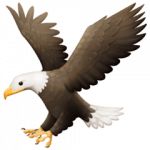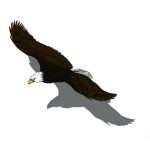By Anya Kaats.
For twenty years, Wes Atkinson owned and operated a successful hunting outfitter business, but in 2012, after a life-altering psychedelic experience, he sold his company and walked away. “Continuing would have been out of integrity with what I had experienced,” Atkinson explained.
Subconsciously, he had already begun to question the ethics and motivations of the industry he was a part of, and the psychedelic experience brought his unfolding realizations to the surface. “Everyone talks about following your bliss, and doing what you love, but nobody talks about what happens when you start contaminating what you love with commerce. I loved what I did, and I had created something I was proud of, but I knew I wasn’t doing good. If I’m going to pour myself into something, let it be for good.”
Atkinson grew up seven miles north of Craig, Colorado. “The middle of nowhere,” as he describes it. Atkinson lived with his father, who worked in a local pit mine, and his brother. “Those were the days when supervision was optional,” Atkinson chuckled. Left to his own devices, Atkinson spent most of his childhood outside, fascinated by the surrounding nature and wildlife. “I would sit in class and realize I hadn’t been listening all day. I was just completely consumed and captivated by what I could experience outside, in the presence of anything from a caterpillar to a deer.”
When Atkinson was five, after practicing for months, he shot and killed a wren with a BB gun. “I learned very quickly about the perception of a bird, the speed of it, the sensitivity of it. I missed for a long time, and the BB would just go off to the side of the bird. Then, one day, it didn’t, and the game I was playing was no longer a game. I remember the adrenaline, and the feeling that took over my body.” Atkinson ran to show his dad, but his dad was distracted by other things, and didn’t give Atkinson the excited reaction he was hoping for. “It took me thirty-five years to realize that so much of my business had been about trying to show my dad the wren. I was looking for the validation of showing somebody what I had done.”

In addition to his psychological realizations, Atkinson also began to recognize that his company was placing him in conflict with his ethics and integrity. “I was asking for more than what Mother Nature could actually provide,” he explained. Assigning a monetary value to animals, and taking their lives without the respect and honor he knew they deserved, became untenable.
“Selling my company didn’t make sense to anyone. Here I was complaining about hunting for a living. I had gotten to a place that other people would have loved to get to. No one was listening. I knew I was going to have to figure this out for myself.” This not only meant selling the company, but also going through a divorce, and confronting himself in painful, profound ways.
“It was ego deconstruction, and the self-responsibility of recognizing that the hunting paradigm was imbalanced for me. I needed to restore my relationship to the feminine.” Atkison was determined to prioritize the spiritual, earth-based principles of hunting that had always been present for him, but that he had felt forced to set aside in order to be a professional.
After selling his company, Atkinson began to explore how he might be able to reconcile his love of hunting with this clarified sense of reverence and responsibility for protecting Mother Nature. “I started to plant some seeds and share ideas. I had this mission to see if I could connect people to what was really happening—to show them what it meant to be present for the life and death of the animal, and to witness the animal transition with intention and awareness.”

photos courtesy Wes Atkinson
One day, Atkinson met someone who asked if he would be willing to mentor him. Atkinson instantly knew that this was what he had been trying to cultivate all along. “I took him from the very first arrow that he ever sent down range, to a perfect shot on a yak, where he was present and connected. On that last breath, there are tears, there is connection, and there’s a reunion that’s happening.
The food, the sustenance, the bones. The individual is just there in reverence to all that the animal provides.”
This first mentorship experience is what ultimately gave birth to Sacred Wyld, a company that Wes co-stewards with his partner Joanna Kraft. Kraft studied the economics of sustainable food production at university and spent seven years working as an organic vegetable farmer. “I loved the relationship that was observable between people and land, and how people and land impact each other on a very deep, cellular level.”
Ultimately, Kraft burned out, and started to work in the service industry, planning and organizing large events. Like Atkinson, she also went through a divorce, and ended up moving to Arizona. “I had put my life into generating a relationship to the earth, but then started to realize how disconnected I actually was from my own body,” Kraft explained.
In 2021, Atkinson and Kraft met in Sedona, and began to combine their shared vision of bringing people together to help them reconnect with each other, their bodies, and the nourishing food and sustenance Mother Nature provides.

Through a “Sacred Harvest” mentorship program, Kraft and Atkinson lead clients through an intensive four-month curriculum. This includes tactical training sessions, and an individualized, rite-of-passage approach that incorporates integrative spiritual modalities, oriented toward the client’s unique intention. “The individual’s relationship to the animal is at the heart of it. There is a personal, spiritual experience that emerges for each person,” Kraft explained.
Atkinson and Kraft are currently working at Kyle Grote’s Cho Ku Rei Yak Ranch just outside of Crestone. Atkinson explained that while he had met with many landowners over the years as a part of his outfitting business, the conversation with Grote was different.
“I was a leader in the hunting industry, but I’d never spoken my truth. This was the first time I sat down with a landowner without mincing words. I didn’t talk in the European way of doing business, I spoke to the heart of the land, and Kyle was 100-percent on board.” Before Atkinson and Kraft started working with the yak at Cho Ku Rei, the animals had to leave the ranch and go to a slaughterhouse. Now, the yak are able to die with dignity on the same land they were born on.
In addition to hunting mentorship programs, Sacred Wyld also curates nature-based, harvest events. In April, Kraft and Atkinson are hosting a ceremonial, week-long event at a friend’s ranch in Texas, during the total solar eclipse.
“Our plan is for everyone to gather communally, and participate in a sacred harvest aligned with the eclipse portal. Ultimately, this is about the interconnectedness of all of us. It’s about the cycles, seasons, archetypes and ecosystems that everything on earth embodies and is sustained by.”
To learn more about Sacred Wyld, visit www.sacredwyld.com.


